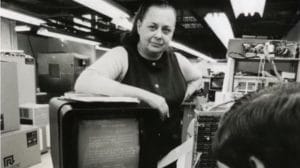Born in the Bronx, at just 15 years old Berezin was ready for college. She wanted to study physics after reading her older brother’s Astounding Science Fiction magazine, but the colleges that taught physics in New York City were men-only, so in 1941 she reluctantly studied economics at the women’s college, Hunter. When the U.S. was pulled into World War II that December, NYC colleges did what they could to keep going: they were more liberal in allowing students to study what they wanted, and they eliminated classes that were redundant with other schools: students attended whatever classes they needed at whatever school offered them. Berezin worked full time during the day and took classes at night from Hunter, New York University, and Brooklyn Polytech (now the New York University Tandon School of Engineering), where she was the first female student they ever had. She received her B.S. in physics in 1945, and then did five years graduate work at NYU, funded by the Atomic Energy Commission. By then it was difficult for physicists to find jobs, so she took a job with a startup, the Electronic Computer Corporation, as the head of its Logic Design Department.

In 1957, Elecom was bought out by Underwood, a typewriter company that wanted to get into computers, but they couldn’t afford to keep the division going and everyone was laid off. Berezin was quickly snapped up by Teleregister, which made stock market ticker tape machines, but they wanted to move into computers too. For them, Berezin designed a computer system for the American Stock Exchange, the first computerized banking system, and the first airline reservation system. The latter, commissioned by United Airlines, was required to work 24 hours a day, 7 days a week. “Many years later, I ran into the engineer who was sent from Teleregister to be permanently in charge of running the system in Denver. He had helped to build the system and knew how it worked. And he told me that the processing system never went completely down in 11 years of operations.” But Berezin ran into discrimination because she was female, when she was turned down for a high-level job with the New York Stock Exchange. “From the first day I went to work in the computer industry in 1951 to [that time] in 1967 or so, I had held the same job,” she said years later. “I ran the logic design department. I had never had another job. And I’m looking up to the next role, to vice president. And I knew damn well that I would never get that job. That job was for a man, and I would never have it.”
So in 1968 she started her own company. “What was unusual is that we didn’t start out having a good idea and then start a company to implement our idea. We started by first deciding that we were going to start a company. But what were we going to do?” She learned that there was a new memory system coming out soon, and Metal Oxide Semiconductor integrated circuits were just starting to be made. After consulting with the Bureau of Labor Statistics and learning that six percent of the U.S. work force were secretaries, she came up with her idea: the first stand-alone dedicated word processor. Until then, crude word processing was done by buying a $15,000 PDP computer and using a terminal. She could build hers for much less. She named her company Redactron, and the machine the Data Secretary. As sales ramped up in the 1970s, the 1973-75 recession pushed back. Berezin sold the company to Burroughs in 1976, but she still wasn’t out. The success of her company, and Business Week magazine naming her the “Most Senior Businesswoman in the United States,” gave Berezin huge credibility. “At that time, in the 1970’s, the woman’s movement was riding high, and companies were scrambling to get a woman on the Board, which is why I was on Boards of very old and very big companies.” In 2015 she was inducted as a fellow by the Computer History Museum “For her early work in computer design and a lifetime of entrepreneurial activity.” Several years ago she made provisions in her will to stipulate that most of her estate will go to Stony Brook University to support science education. Berezin died December 8, at 93.
